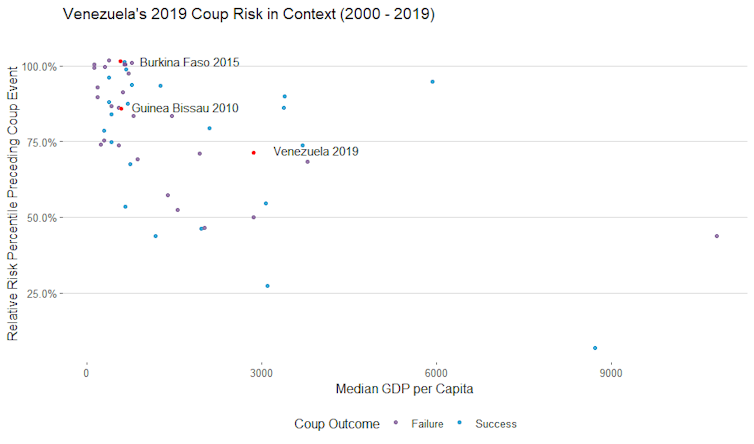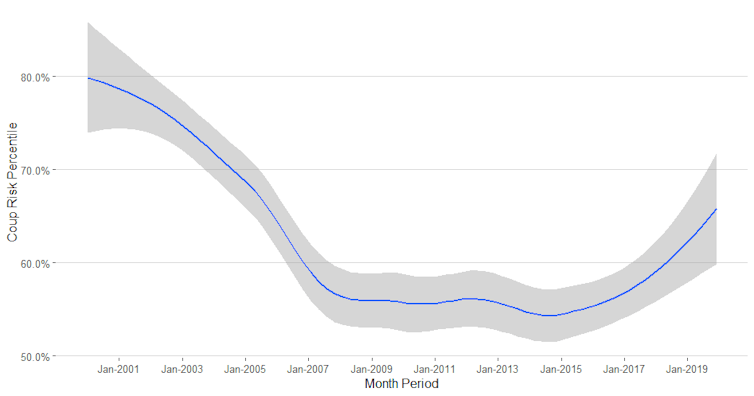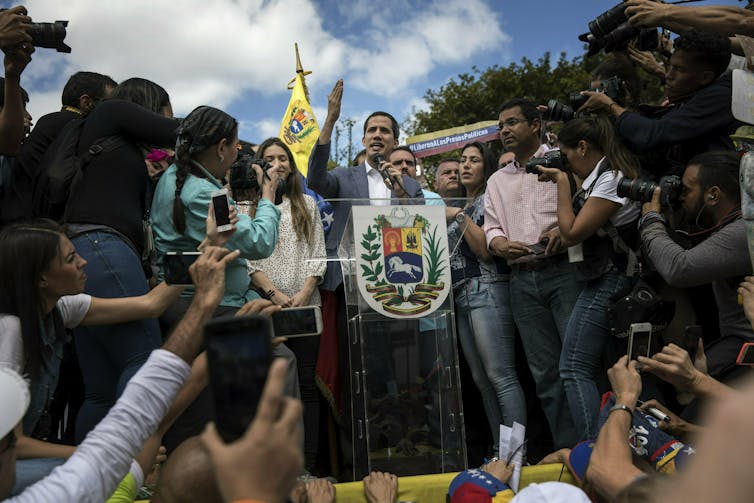Odds of military coup in Venezuela rise every day Maduro stays in office
- Written by Clayton Besaw, Political Science Researcher, University of Central Florida
It would be reasonable to expect the worst for Nicolás Maduro, Venezuela’s embattled president.
Two weeks after Maduro’s re-inauguration[1], opposition leader Juan Gauidó[2] has declared himself the country’s rightful president. The power struggle[3] follows a failed military mutiny[4] against Maduro, whose easy re-election in May 2018 during an economic, political and humanitarian crisis has lead many to say Venezuela is a dictatorship[5].
Analysts worldwide are already debating whether a coup against Maduro – with[6] or without U.S. backing – would be good or bad for Venezuelan democracy[7].
As a political risk analyst, it is my job to predict when leaders will be overthrown[8]. Surprisingly, the coup forecaster[9] I use, CoupCast, shows Maduro hanging on – at least for now.
Why won’t Maduro be overthrown soon?
Using historic data on the conditions behind every coup and coup attempt since 1950, CoupCast has identified six factors that can suggest a leader is at imminent risk of overthrow.
- Tenure of current leader – Longer reign equals higher coup risk.
- How long regime has been in power – Young regimes are at most risk of a coup.
- Time since last coup attempt – The longer a country goes without a coup, the less its risk of a leader being overthrown.
- Incumbent electoral defeat – Recent electoral defeats increase risk. So do long periods of incumbent victories.
- Relative precipitation – Extreme drought and excessive rainfall both raise coup risk because they can disrupt agricultural and market dynamics.
- Gross domestic product (GDP) per person – This measure of wealth distribution can provide clues into whether a leader can buy off potential rivals[10] within the military.
Beyond Venezuela’s economic crisis[11], the Maduro regime does not stand out on any CoupCast factors.
 Venezuela’s GDP per person is relatively high compared to other countries that have seen coups.
Rulers, Elections, and Irregular Governance Dataset (REIGN)
Venezuela’s GDP per person is relatively high compared to other countries that have seen coups.
Rulers, Elections, and Irregular Governance Dataset (REIGN)
Maduro has been in office since 2013 – not long enough to be high-risk. Likelihood of a coup begins to rise after 15 years, on average.
The current Socialist Party regime, which began with Hugo Chávez in 1999[12], has also matured enough to avoid the initial period of vulnerability that young regimes face.
The last coup attempt in Venezuela was a failed plot against Chávez in 2002[13], a healthy 17-year buffer. The average lapse between coups is five years.
Venezuela’s Socialist regime has not lost a presidential election since Chávez first won, in 1998, which also bodes well for Maduro.
Finally, in 2019, Venezuela is not expected to have droughts, floods or other weather that is out of the norm.
Taken together, these factors do not suggest an imminent coup against Maduro.
Rising coup risk
However, Venezuela’s risk of coup increases the longer Maduro stays in power, as CoupCast’s trove of historic data shows.
 Venezuela’s coup risk was highest following the attempted overthrow of Hugo Chávez in 2002. But it rises the longer Maduro stays in power.
Rulers, Elections, and Irregular Governance Dataset (REIGN)
Venezuela’s coup risk was highest following the attempted overthrow of Hugo Chávez in 2002. But it rises the longer Maduro stays in power.
Rulers, Elections, and Irregular Governance Dataset (REIGN)
Maduro’s biggest vulnerability is the prospect of further economic decline. Venezuela’s oil-fueled government is going bankrupt[14] due to declining petroleum production, U.S. and EU sanctions[15] and seized assets[16]. Eventually, Maduro’s strategy of paying the military brass for its loyalty will be unsustainable.
Maduro’s position becomes especially precarious over time if he continues to stand for election. Authoritarians who hold elections are at higher risk of being deposed[17] – especially if they lose and stick around anyway. Venezuela’s coup risk increases the longer Maduro continues to “win” elections as well.
However, even the most powerful forecasting models cannot account for everything.
Venezuela’s deep economic crisis, for example, is somewhat misleading. Citizens are hurting badly, but the Maduro government still has enough funds to offer military leaders governmental appointments and economic kickbacks[18]. That make a serious plot against him less likely[19].
Russia, China, and Turkey have also expressed support for the regime[20] – potentially even military backing – likely depressing coup risk further.
Guaidó’s challenge really hurts Maduro
The recent power struggle most similar to what’s happening in Venezuela occurred in Zimbabwe in 2008.
Opposition leader Morgan Tsvangirai[21] claimed to be the legitimate winner of a flawed election against long-time President Robert Mugabe. Mugabe retaliated with a campaign of violence and intimidation[22] to secure his victory in a dubious runoff.
 Juan Guaido has declared himself president of Venezuela.
AP Photo/Rodrigo Abd[23]
Juan Guaido has declared himself president of Venezuela.
AP Photo/Rodrigo Abd[23]
Tsvangirai’s power struggle didn’t unseat Mugabe, but it likely hurt his legitimacy internally. Mugabe was overthrown in a military coup in November 2017[24].
In my assessment, Guaidó’s challenge won’t result in Maduro’s immediate exit – but it will further weaken his base of support, both among the Venezuelan people and within the government.
The longer Maduro stays in power, the more likely he is to be removed by force[25].
References
- ^ re-inauguration (theconversation.com)
- ^ Juan Gauidó (www.aljazeera.com)
- ^ power struggle (theconversation.com)
- ^ failed military mutiny (time.com)
- ^ dictatorship (theconversation.com)
- ^ with (www.washingtonpost.com)
- ^ good or bad for Venezuelan democracy (foreignpolicy.com)
- ^ predict when leaders will be overthrown (theconversation.com)
- ^ coup forecaster (oefresearch.org)
- ^ buy off potential rivals (journals.sagepub.com)
- ^ economic crisis (www.cnbc.com)
- ^ began with Hugo Chávez in 1999 (www.cnn.com)
- ^ failed plot against Chávez in 2002 (www.uky.edu)
- ^ Venezuela’s oil-fueled government is going bankrupt (www.forbes.com)
- ^ U.S. and EU sanctions (theconversation.com)
- ^ seized assets (www.forbes.com)
- ^ higher risk of being deposed (politicalviolenceataglance.org)
- ^ military leaders governmental appointments and economic kickbacks (www.reuters.com)
- ^ less likely (journals.sagepub.com)
- ^ expressed support for the regime (www.cnn.com)
- ^ Morgan Tsvangirai (www.theguardian.com)
- ^ campaign of violence and intimidation (www.theguardian.com)
- ^ AP Photo/Rodrigo Abd (www.apimages.com)
- ^ overthrown in a military coup in November 2017 (theconversation.com)
- ^ removed by force (theconversation.com)
Authors: Clayton Besaw, Political Science Researcher, University of Central Florida

